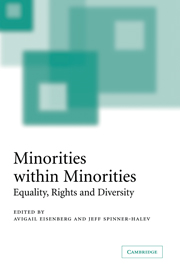Book contents
- Frontmatter
- Contents
- Notes on Contributors
- Acknowledgements
- Introduction
- Part I Toleration
- Part II Equality
- 3 Multiculturalism and feminism: no simple question, no simple answers
- 4 Can intra-group equality co-exist with cultural diversity? Re-examining multicultural frameworks of accommodation
- 5 Dilemmas of gender and culture: the judge, the democrat and the political activist
- 6 The rights of internal linguistic minorities
- Part III Individual autonomy
- Part IV Self-determination
- Part V Democracy
- References
- Index
6 - The rights of internal linguistic minorities
Published online by Cambridge University Press: 22 September 2009
- Frontmatter
- Contents
- Notes on Contributors
- Acknowledgements
- Introduction
- Part I Toleration
- Part II Equality
- 3 Multiculturalism and feminism: no simple question, no simple answers
- 4 Can intra-group equality co-exist with cultural diversity? Re-examining multicultural frameworks of accommodation
- 5 Dilemmas of gender and culture: the judge, the democrat and the political activist
- 6 The rights of internal linguistic minorities
- Part III Individual autonomy
- Part IV Self-determination
- Part V Democracy
- References
- Index
Summary
Considerable attention has been devoted to theorizing the rights of minority cultures in recent years. Political theorists have developed accounts of the normative questions raised by issues of race, immigration, nationalism, indigenous peoples and religion. After a period of neglect, theorists are now starting to turn their attention to the normative issues posed by another form of diversity: linguistic diversity. The past few years have seen the publication of a number of accounts of the implications of normative principles of equality, autonomy and democracy for language policy.
Although normative theorizing about language rights is still in its infancy, it is becoming possible to make out the main positions. The debate over language rights typically pits “nation-builders,” who emphasize the goods that can be realized by diffusing a single language and culture throughout the state, against “language maintainers,” who stress the value of preserving vulnerable languages and language communities.
The nation-builders are, at best, indifferent to minority language rights, and often argue against them on the grounds that they discourage state-wide linguistic convergence. They may allow a “norm-and-accommodation” regime of language rights that permits certain transitional accommodations for people with limited proficiency in the normal state or “national” language. But they typically oppose “official” language rights – that is, rights that minority-language speakers might enjoy to the public use of their language (e.g. in the delivery of public services, in the public schools, etc.) even when they are perfectly fluent in the majority language that would otherwise be used in public settings.
- Type
- Chapter
- Information
- Minorities within MinoritiesEquality, Rights and Diversity, pp. 135 - 154Publisher: Cambridge University PressPrint publication year: 2005
- 5
- Cited by

